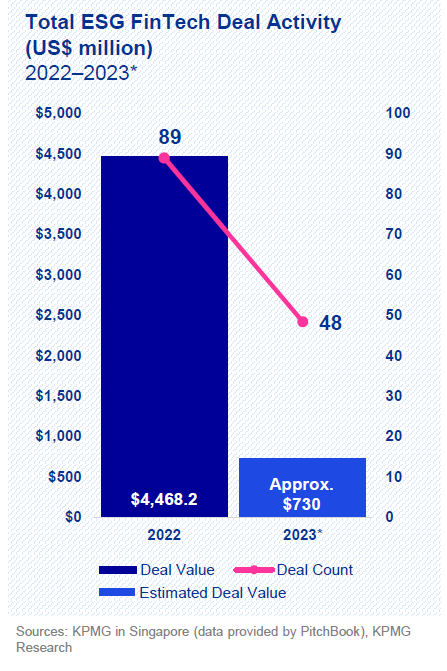The year 2023 brought several challenges to the global fintech landscape, including economic uncertainties and geopolitical tensions. Nevertheless, the ESG (Environmental, Social, and Governance) fintech sector in the Asia Pacific region has emerged as a resilient outlier. Despite the prevailing headwinds, ESG trends in Asia Pacific have continued to progress steadily, driven by the imperative to transition towards a low-carbon emission model and the committed support of large corporations.
In this listicle, we will explore five noteworthy ESG trends that have been shaping the Asia Pacific region, highlighting the significance of sustainability and innovation in the financial sector.
Emergence of ESG Fintech Hubs
ESG fintech hubs are on the rise globally, and Asia Pacific is no exception. While cities like San Francisco and New York have been at the forefront of ESG fintech development, Europe has seen London leading the sector, closely followed by Paris. In the Asia Pacific region, Sydney and Singapore stand out as emerging ESG fintech hubs.
The Monetary Authority of Singapore (MAS) took a significant step by launching the ESG Impact Hub in 2022. This initiative aims to foster collaboration between ESG fintech startups, solution providers, financial institutions, and real economy stakeholders. It also supports industry-driven sustainability initiatives like the Point Carbon Zero Programme and KPMG’s ESG Business Foundry. Australia’s ESG fintech sector is also gaining traction, ranking second within the APAC Region.
Surge in ESG Regulation
The Asia-Pacific region is experiencing a surge in ESG regulation, driven by the increasing demand for transparency and stricter definitions for sustainable investment products. The Monetary Authority of Singapore (MAS) has introduced transition planning recommendations for financial institutions, set to provide guidelines for banks, asset managers, and insurers to develop credible net-zero transition plans.
Australia has also taken steps towards sustainable finance, with the government publishing a draft sustainable finance strategy aimed at mobilizing private and public investments to support companies’ transition to lower-carbon and more sustainable operations. Several other Asia Pacific governments, including the Philippines and Japan, are adopting sustainable finance frameworks, reflecting the region’s commitment to ESG principles.
ESG Fintech Trendsetters in APAC
Zooming in on the geographical landscape of ESG fintech investment activity in the Asia Pacific region, China, India, Australia, and Singapore emerge as prominent leaders in the sector. Data reveals these four nations as hotspots for ESG fintech innovation.
China and Australia have particularly stood out with the highest deal values in 2023, collectively accounting for over two-thirds of ESG fintech funding in the region. Their success is attributed to substantial deals that have solidified their positions in sustainable finance.
India and Singapore, though with fewer large transactions, have demonstrated vibrant ESG fintech ecosystems through a high volume of smaller deals, emphasizing their commitment to nurturing innovative startups and sustainable finance solutions. Japan, to a lesser extent, has also shown dynamism in the ESG fintech sphere.
ESG Fintechs Incentivising Carbon Accountability
Promoting carbon accountability has become a focal point for ESG fintechs in the Asia Pacific region. Chinese insurer Ping An, for example, has introduced carbon accountability technology that allows its cardholders to create personal carbon accounts and track their carbon footprint through their purchasing history. Other methods include receiving carbon credits for selecting greener options and providing rating services for responsible carbon expenses.
The growing emphasis on climate change ratings presents profitable opportunities for service providers capable of collecting the right data, structuring it effectively, and aligning with governments and supranational bodies. This trend is expected to persist in 2024 and beyond.
ESG fintechs have found substantial growth in ESG data intelligence and analytics, particularly in carbon tracking and offsetting, according to the McKinsey Global Retail Banking Survey.
Centralising Green Data
Effective ESG fintech innovation relies heavily on data, but accessible and usable information has been in short supply. Gathering useful ESG data is challenging due to the long lead time required to record, compile, and analyse it. Organizations need better data to make informed decisions about capital allocation and decarbonisation efforts.
Singapore’s MAS has championed Project Greenprint to address these data challenges. They have engaged the financial industry and other sectors to identify digital enablers for data management. The integrated platform, Gprnt.ai, unveiled at the Singapore Fintech Festival 2023, aims to consolidate ongoing pilot projects under Project Greenprint and facilitate Singapore’s national-level sustainability reporting and data requirements.
Beyond Singapore, Greenprint plans to collaborate with partners worldwide to gather data from various countries and sectors, supporting climate risk management and the transition to a net-zero future. The official launch of Greenprint is scheduled for February 2023, with further expansion throughout the year.
ESG trends in Asia Pacific have showcased resilience and growth despite economic challenges. As ESG considerations gain prominence and regulatory frameworks evolve, the ESG fintech sector in the region is poised for sustained innovation and investment. The emergence of ESG fintech hubs, increased regulation, leadership from countries like China, India, Australia, and Singapore, and the focus on carbon accountability and data management all contribute to the sector’s significance in shaping the future of sustainable finance in the Asia Pacific region.
Featured image credit: edited from freepik









